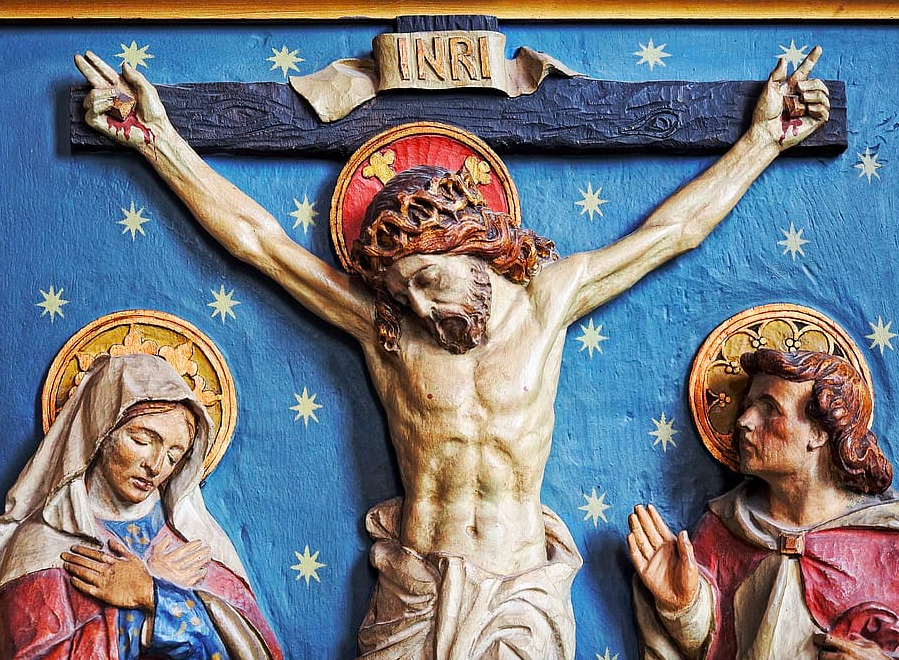by Abbott Kenneth Gilespie
Almighty God, you know that we have no power in ourselves to help ourselves: Keep us both outwardly in our bodies and inwardly in our souls, that we may be defended from all adversities that may happen to the body, and from all evil thoughts that may assault and
hurt the soul; through Jesus Christ our Lord, who lives and reigns with you and the Holy Spirit, one God, for ever and ever. Amen.
Brothers, may the grace of our Lord Jesus Christ, and the love of God, and the fellowship of the Holy Spirit be with you all. I think probably all of you know that there is more to our Gospel lesson for this past Sunday, what we read earlier was in many ways just the introduction. Our Lord continues his response to Nikodemus in verse 16 by telling him “For God so loved the world, that he gave his only Son, that whoever believes in him
should not perish but have eternal life. For God did not send his Son into the world to condemn the world, but in order that the world might be saved through him. Whoever believes in him is not condemned, but whoever does not believe is condemned already, because he has not believed in the name of the only Son of God. And this is the
judgment: the light has come into the world, and people loved the darkness rather than the light because their works were evil. For everyone who does wicked things hates the light and does not come to the light, lest his works should be exposed. But whoever does what is true comes to the light, so that it may be clearly seen that his works have been carried out in God.”
You see, we serve a Lord who loves us each deeply, so much so that he was willing to suffer and die for us, that we might have eternal life. In the collect for this second Sunday in Lent we acknowledged out utter inability to save ourselves and asked for God’s mercy, his deliverance, against all the assaults of the body and of the soul. This speaks of a great trust in the Lord, one which carries us through any circumstance, and adversity. The world
in which we live is riddled with adversity, both against the body and soul. The culture and society in which we live is peddling a message that sounds like love and acceptance for all, but in reality, it is nothing more than deceit designed to lead you away from Jesus as your Lord and ensnare you to the lordship of a thousand other false gods, ourselves as our own god being the chief temptation and the most inept choice of all. This is why we commit
ourselves to obedience, to our rule of life, and our bishops. We recognize in our vows the reality expressed in this collect, that we truly are incapable of helping ourselves.
We cannot save ourselves, not by any great acts of heroism or accomplishment, not by a lifetime of service or sacrifice, not by earning more or by name recognition. We are saved only by the grace of God, through faith in our Lord. Our Lord who did not come into this world to condemn us or anyone else, but to offer each of us a means of salvation—of eternal life. But what does this mean to believe in Him? Is it simply to acknowledge he
exists, the man Jesus of Nazareth walked the earth, is that enough? How about to acknowledge, as Nikodemus does, that God must be with Jesus in order for him to perform such impressive miracles and wonders, is that enough? What is this belief Jesus is talking about? This is an important question to consider; our salvation depends upon it.
Is it even enough to just acknowledge that Jesus is God? Is that belief enough? Satan and every demon acknowledges that, so then what is it? What does it mean to believe? Saint Paul tells us in his epistle to the Romans that Abraham believed God, and it was his belief that was counted as righteousness. Abraham did not just believe in God, he believed Him. He accepted what God told him, promised him. As Saint Paul says, Abraham had faith, and it was his faith that set him apart, it was his faith that was counted as righteousness.
There are a lot of ways people can believe in God and still choose to remain lost in the darkness. We have agnostics and deists who believe in a creator, but don’t believe it is knowable. We have those who acknowledge the Father and even Jesus, but that is about the extent of it, acknowledgment. We even have those who call themselves Christians, who visit a church every once in a while, maybe even own a bible and some prayer beads, who maybe even at one point asked Jesus to be their Lord. None of that is enough. We must have faith in Him.
Our catechism in response to the question: What does it mean for you to have faith? Tells us: To have faith means that I believe the Gospel is the truth: that Jesus died for my sins, rose from the dead, and rules over my life. Therefore, I entrust myself to him as my Savior, and I obey him as my Lord. We entrust ourselves to Him as our Savior and obey Him as our Lord. Abraham left everything he knew. The Lord told him to “Go from your country, your kindred, and your father’s house.” That is pretty significant, especially in middle eastern culture. He left his peace, his comfort, his security, his safety-net, and followed the Lord in faith. It is that same faith that we must have. To be willing to walk away from things that are good, things and people we love, and radically follow Christ as our Lord. Even at the expense of our comfort, our security, our safety-net. In this, we can see the wisdom of our vow of simplicity, not to simply deny ourselves joy, quite the opposite, to instead prioritize the joy of God over all else, and to seek to avoid over-complications and unhealthy attachments that distract us from radically following Christ as Lord.

We entrust ourselves to Him as our Savior and obey Him as our Lord. To believe in Him, is to believe that He loves you, that He died for you, that He knows you inside and out and knows what is best for you. To believe in Him is to trust in Him. To accept not just the bits and pieces of the faith that you like, that are comfortable, that make sense, but all of it. The entire Gospel, for it truly is good news.
Almighty God, who loves you deeply, desires you. He wants to save you—he wants the best for you. We must each ask ourselves the question, will I receive Him as my Lord? That is not a once-in-your-lifetime question, it is a question we must answer every day, which every decision we make. Will we receive Him as our Lord? Will we allow Him to keep us both outwardly in our body and inwardly in our soul? Will we allow him to defend us from
all adversities that may happen to the body and from all evil thoughts that may assault our soul? Will we allow him to feed and nourish us through His Church, with His Holy Word and Sacrament, with His Body and His Blood as he promised us he would? Will you receive Him as your Lord?
Let us pray,
Almighty and gracious Lord, grant us the grace to believe, to accept, to trust in You fully, with all of our being. To receive you as our Lord completely and without hesitation or doubt, withholding nothing from You. To entrust ourselves to you fully and obey you in all things. We ask this in Your name, Lord Jesus Christ, the only begotten Son of God, who lives and reigns in unity with the Father and the Holy Spirit, one God, now and evermore. Amen.
Blessings,
Ab. Kenneth


Thank you for being of assistance to me. I really loved this article.